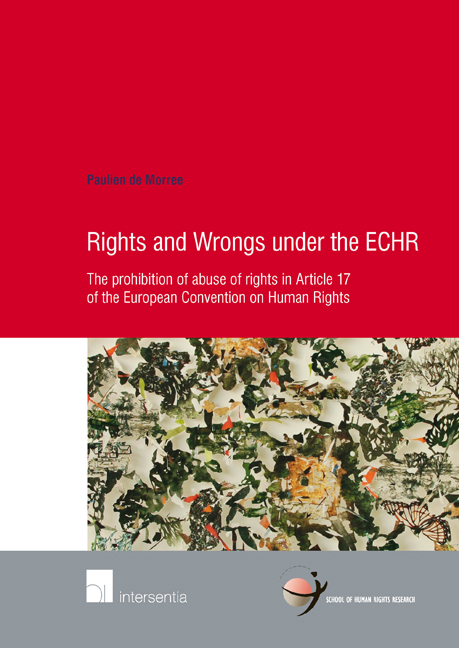 Rights and Wrongs under the ECHR
Rights and Wrongs under the ECHR Book contents
- Frontmatter
- Acknowledgements
- Contents
- List of Abbreviations
- Chapter 1 Introduction
- Chapter 2 The Creation of the European Convention on Human Rights
- Chapter 3 The Strasbourg Case Law on Article 17 ECHR
- Chapter 4 The Interpretation of Article 17 Echr in Legal Doctrine
- Chapter 5 Other Abuse Clauses in Human Rights Law
- Chapter 6 The Concept of Abuse of Rights
- Chapter 7 The Concept of Militant Democracy
- Chapter 8 The German ‘Wehrhafte Demokratie’
- Chapter 9 Militant Democracy in the Context of the ECHR
- Chapter 10 Conclusions
- Bibliography
- Table of Cases
- Samenvatting
- Curriculum Vitae
- School of Human Rights Research Series
Chapter 10 - Conclusions
Published online by Cambridge University Press: 12 December 2017
- Frontmatter
- Acknowledgements
- Contents
- List of Abbreviations
- Chapter 1 Introduction
- Chapter 2 The Creation of the European Convention on Human Rights
- Chapter 3 The Strasbourg Case Law on Article 17 ECHR
- Chapter 4 The Interpretation of Article 17 Echr in Legal Doctrine
- Chapter 5 Other Abuse Clauses in Human Rights Law
- Chapter 6 The Concept of Abuse of Rights
- Chapter 7 The Concept of Militant Democracy
- Chapter 8 The German ‘Wehrhafte Demokratie’
- Chapter 9 Militant Democracy in the Context of the ECHR
- Chapter 10 Conclusions
- Bibliography
- Table of Cases
- Samenvatting
- Curriculum Vitae
- School of Human Rights Research Series
Summary
‘A force de sacrifier l'essentiel pour l'urgence, on finit par oublier l'urgence de l'essentiel’
Edgar Morin, La MéthodeIntroduction
This study focused on the prohibition of abuse of rights in Article 17 ECHR. This provision, also referred to as the abuse clause, prohibits an abuse of the fundamental rights guaranteed in the Convention. It provides that ‘[n]othing in this Convention may be interpreted as implying for any State, group or person any right to engage in any activity or perform any act aimed at the destruction of any of the rights and freedoms set forth herein or at their limitation to a greater extent than is provided for in the Convention’.
The abuse clause in Article 17 ECHR is one of the most fundamental provisions of the Convention. It embodies one of its main principles: its commitment to democracy and democratic values. By preventing groups and individuals with anti-democratic aims from successfully invoking fundamental rights and freedoms, ‘Article 17 ECHR is a microcosm for particular instances of what the Convention as a whole is meant to do on a larger scale: to protect democracy and to prevent totalitarianism’.
At the same time it is also one of the Convention's most controversial provisions. It is phrased in rather ambiguous terms and it remains unclear what exactly it aims to defend. Democracy and democratic values are abstract notions that are not clearly defined in the ECHR or in the Strasbourg case law. In addition, there unmistakably exists an inherent tension between human rights protection and the abuse clause.4 While human rights essentially aim to promote freedom by affirming the basic rights and freedoms citizens enjoy vis-à-vis state authorities, the abuse clause primarily aims to protect democracy and democratic values against groups and individuals invoking these rights with the aim of undermining the democratic organisation of the state. The question when the use of a fundamental right turns into abuse is therefore an extremely complicated one, both for academics and for courts required to adjudicate on it. This makes the interpretation and the application of the abuse clause a highly delicate and controversial matter.
- Type
- Chapter
- Information
- Rights and Wrongs under the ECHRThe prohibition of abuse of rights in Article 17 of the European Convention on Human Rights, pp. 247 - 264Publisher: IntersentiaPrint publication year: 2016
